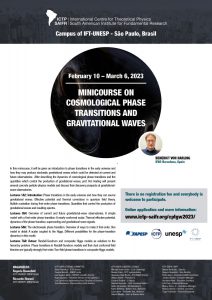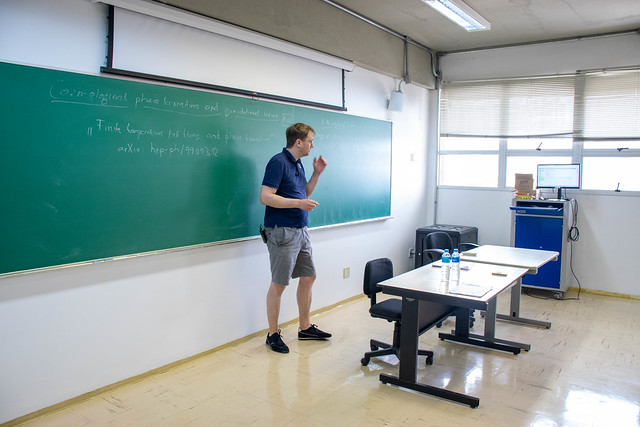Minicourse on Cosmological Phase Transitions and Gravitational Waves
February 10 – March 6, 2023
ICTP-SAIFR, São Paulo, Brazil
Room 3 of IFT-UNESP
Home
In this minicourse, I will give an introduction to phase transitions in the early universe and how they may produce stochastic gravitational waves which could be detected at current and future observatories. After describing the dynamics of cosmological phase transitions and the quantities which control the production of gravitational waves, I will present several concrete particle-physics models and discuss their discovery prospects at gravitational-wave observatories.
Dates:
- 1st week: Friday, February 10
- 2nd week: Monday, Wednesday and Friday (February 13, 15 and 17)
- 3rd week: No lectures
- 4th week: Monday, Wednesday and Friday (February 27, March 1 and 3)
- 5th week: Monday, March 6, from 13:00 to 14:30
Times: 10:30 am to 12:00 pm
Lectures 1&2: Introduction: Phase transitions in the early universe and how they can source gravitational waves. Effective potential and thermal corrections in quantum field theory. Bubble nucleation during first-order phase transitions. Quantities that control the production of gravitational waves and resulting spectra.
Lectures 3&4: Overview of current and future gravitational-wave observatories. A simple model with a first-order phase transition: A nearly-conformal scalar. Thermal effective potential, dynamics of the phase transition, supercooling and gravitational-wave signals.
Lectures 5&6: The electroweak phase transition. Overview of ways to make it first-order. One model in detail: A scalar coupled to the Higgs. Different possibilities for the phase-transition dynamics in this model.
Lectures 7&8: Detour: Randall-Sundrum and composite Higgs models as solutions to the hierarchy problem. Phase transitions in Randall-Sundrum models and their dual conformal field theories are typically strongly first-order. Two-field phase transitions in composite Higgs models.
There is no registration fee and everybody is welcome to participate.
Lecturer:
- Benedict von Harling (IFAE-Barcelona, Spain)
Organizers:
- Rogerio Rosenfeld (ICTP-SAIFR/IFT-UNESP, Brazil)
- Riccardo Sturani ((ICTP-SAIFR/IFT-UNESP, Brazil)
Poster:
Program
Videos and Files
-
10:30 - Benedict von Harling (IFAE-Barcelona):
Minicourse on Cosmological Phase Transitions and Gravitational Waves - Class 1 of 7
-
10:30 - Benedict von Harling (IFAE-Barcelona):
Minicourse on Cosmological Phase Transitions and Gravitational Waves - Class 2 of 7
-
10:30 - Benedict von Harling (IFAE-Barcelona):
Minicourse on Cosmological Phase Transitions and Gravitational Waves - Class 3 of 7
-
10:30 - Benedict von Harling (IFAE-Barcelona):
Minicourse on Cosmological Phase Transitions and Gravitational Waves - Class 4 of 7
-
10:30 - Benedict von Harling (IFAE-Barcelona):
Minicourse on Cosmological Phase Transitions and Gravitational Waves - Class 5 of 7
-
10:30 - Benedict von Harling (IFAE-Barcelona):
Minicourse on Cosmological Phase Transitions and Gravitational Waves - Class 6 of 7
-
10:30 - Benedict von Harling (IFAE-Barcelona):
Minicourse on Cosmological Phase Transitions and Gravitational Waves - Class 7 of 7
asdasdasd
Photos
Additional Information
COVID-19: Fully vaccinated Brazilians and foreigners are now exempt from presenting proof of a COVID-19 test with a negative or non-detectable result. You are only required to present proof of vaccination, printed or electronically. See requirements for travelling to Brazil at https://www.latam.com/
Visa information: Nationals from several countries in Latin America and Europe, Australia, Canada, Japan and USA are exempt from tourist visa. Please check here which nationals need a tourist visa to enter Brazil.
Hotel recommendation: http://www.ictp-saifr.org/hotel-recommendations-2.
How to reach the Institute: The minicourse will be held at ICTP South American Institute, located at IFT-UNESP, which is across the street from a major bus and subway terminal (Terminal Barra Funda). The address which is closer to the entrance of the IFT-UNESP building is R. Jornalista Aloysio Biondi, 120 – Barra Funda, São Paulo. The easiest way to reach us is by subway or bus, please find instructions here.


